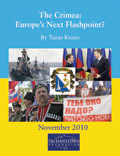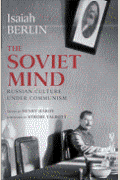With the world’s attention riveted on the standoff in Crimea and continuing political uncertainty in Kyiv, here are selected titles on issues related to Crimea, Ukraine and Russia. Last month, Brookings Now showcased Brookings titles on Russia, its economy and politics, relations with neighbors and the world, and Vladimir Putin himself.
Follow all research and commentary on Ukraine here and also from the Center on the United States and Europe.

The Crimea – Europe’s Next Flashpoint?
Jamestown Foundation
Russia has always had a difficult time accepting Ukraine as an independent state—and even more trouble acknowledging Ukraine’s sovereignty over the Crimea and the port of Sevastopol. In this short volume, Taras Kuzio provided an in-depth analysis of Russia-Ukraine relations and the future of Crimea and the port of Sevastopol.
 The Fight for Influence: Russia in Central Asia
The Fight for Influence: Russia in Central Asia
Alexey Malashenko offers a comprehensive analysis of Russian policies and prospects in Central Asia. It is clear that Russian policy in the former Soviet space is entering uncharted territory. But does the ruling establishment understand the fundamental shifts under way? It is time for Moscow to rethink its approach to Central Asia.
A Big Bets & Black Swans presidential memo
To punish Moldova, Georgia and Ukraine for their efforts to deepen relations with the European Union, Putin’s Russia could resort to trade sanctions, gas cut-offs and other pressures, say Fiona Hill and Steven Pifer. While U.S. leverage is limited, President Obama should develop a common line with the European Union that such Russian actions would have consequences for its relations with the West.
 Mr. Putin: Operative in the Kremlin
Mr. Putin: Operative in the Kremlin
In Mr. Putin, Russia experts Fiona Hill and Clifford Gaddy argue that Russia’s President, Vladimir Putin, is in fact a man of many and complex identities. Drawing on a range of sources, including their own personal encounters, they describe six that are most essential: the Statist, the History Man, the Survivalist, the Outsider, the Free Marketeer, and the Case Officer. Understanding Putin’s multiple dimensions is crucial for policymakers trying to decide how best to deal with Russia.
 Russia and the New World Disorder
Russia and the New World Disorder
Available October 1, 2014
Russia has strongly reasserted itself on the international stage. In the worldview of President Vladimir Putin and the Kremlin, the inevitable decline of the West and rise of the rest provide an opportunity for Russia to fulfill its mission as an independent center of global power. What are the origins of this increasingly aggressive stance? What are the geopolitical ramifications? And what will be the likely outcomes? In this timely and accessible work, former diplomat and renowned Russia analyst Bobo Lo examines the interplay between contemporary Russian foreign policy and a global environment that has rarely been more fluid and uncertain.
 Hard Diplomacy and Soft Coercion: Russia’s Influence Abroad
Hard Diplomacy and Soft Coercion: Russia’s Influence Abroad
This book investigates Russian mechanisms designed to influence and attract countries in the “Common Neighborhood” (Azerbaijan, Belarus, China, Estonia, Finland, Georgia, Kazakhstan, Latvia, Lithuania, Mongolia, North Korea, Norway, Poland, and Ukraine) and beyond. An understanding of Russian influence abroad must include the growing component of soft power, but cannot be confined to it or bound by established Western definitions of the concept.
 The Soviet Mind: Russian Culture under Communism
The Soviet Mind: Russian Culture under Communism
Isaiah Berlin, edited by Henry Hardy
Never before collected, Isaiah Berlin’s writings about the Soviet Union include his accounts of his famous meetings with Russian writers shortly after the Second World War; the celebrated 1945 Foreign Office memorandum on the state of the arts under Stalin; his account of Stalin’s manipulative “artificial dialectic”; portraits of Osip Mandelshtam and Boris Pasternak; his survey of Soviet Russian culture written after a visit in 1956; a postscript stimulated by the events of 1989; and more. This collection includes essays that have never been published before, as well as works that are not widely known because they were published under pseudonyms to protect relatives living in Russia.
The Brookings Institution is committed to quality, independence, and impact.
We are supported by a diverse array of funders. In line with our values and policies, each Brookings publication represents the sole views of its author(s).




Commentary
Brookings Books on Ukraine and Crimea
March 4, 2014